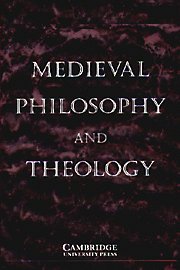Article contents
God, Indivisibles, and Logic in the Later Middle Ages: Adam Wodeham’s Response to Henry of Harclay
Published online by Cambridge University Press: 01 March 1998
Abstract
As its modern edition appears in the Synthese Historical Library, Adam Wodeham’s Tractatus de indivisibilibus does not appear to belong to any one discipline. With regard to its intended audience, the notice of the book appearing on the back cover states that “This book is an important contribution to the history of philosophy.” But it continues, “It will be of interest to all medievalists, particularly to those concerned with medieval science, philosophy, and logic. Theologians and historians of mathematics will also find it useful.”Adam de Wodeham, Tractatus de indivisibilibus. A Critical Edition with Introduction, Translation, and Textual Notes, ed. Rega Wood (Dordrecht: Kluwer Academic Publishers, 1988). In its medieval context as well, Tractatus de indivisibilibus had ambiguous disciplinary status. It begins with the question, “Whether charity or [any] other incorruptible form is composed of indivisible forms.”Wodeham, Tractatus de indivisibilibus, p. 33. Such a reference to charity signals a connection to the Sentences of Peter Lombard, Book I, dist. 17. In introducing his answer to this question, however, Wodeham states, “Because this difficulty is the same for all composite divisible things, whether intensive or extensive, which are of one and the same species or homogeneous, therefore I will briefly inquire indifferently concerning the former and the latter.”Wodeham, Tractatus de indivisibilibus, pp. 34–35. Here and elsewhere, I occasionally modify Rega Wood’s translation in the interests of exactness. The solutions Wodeham then proposes to the questions he asks rely nearly always on logic.
- Type
- Research Article
- Information
- Copyright
- © 1998 Cambridge University Press
- 6
- Cited by




